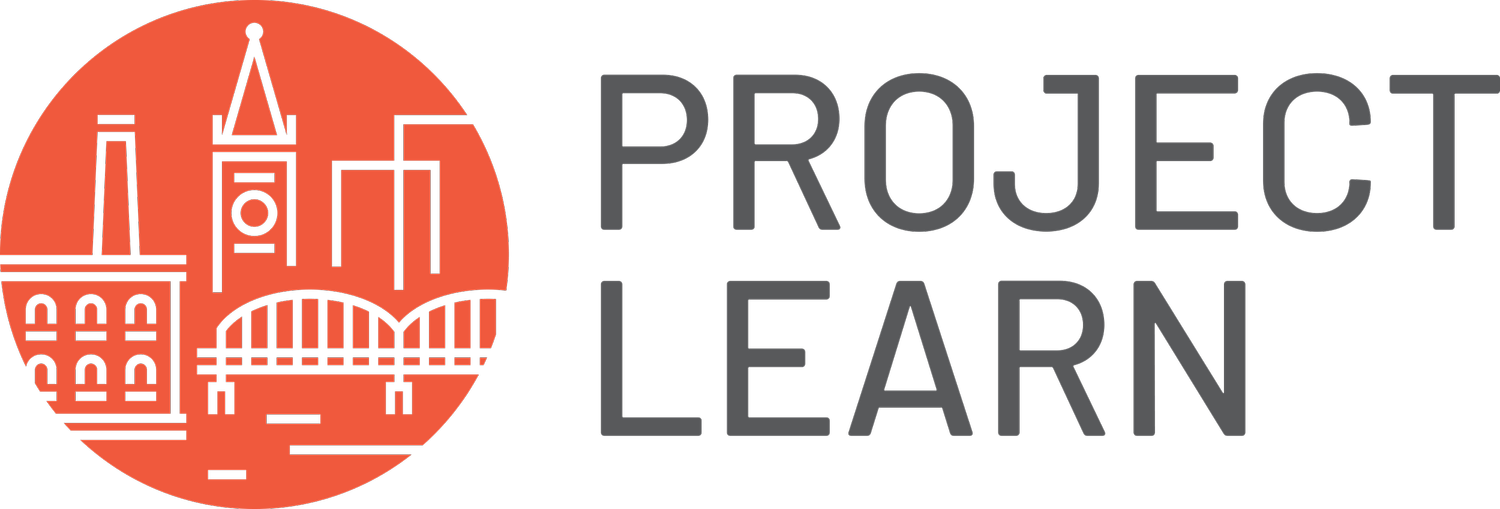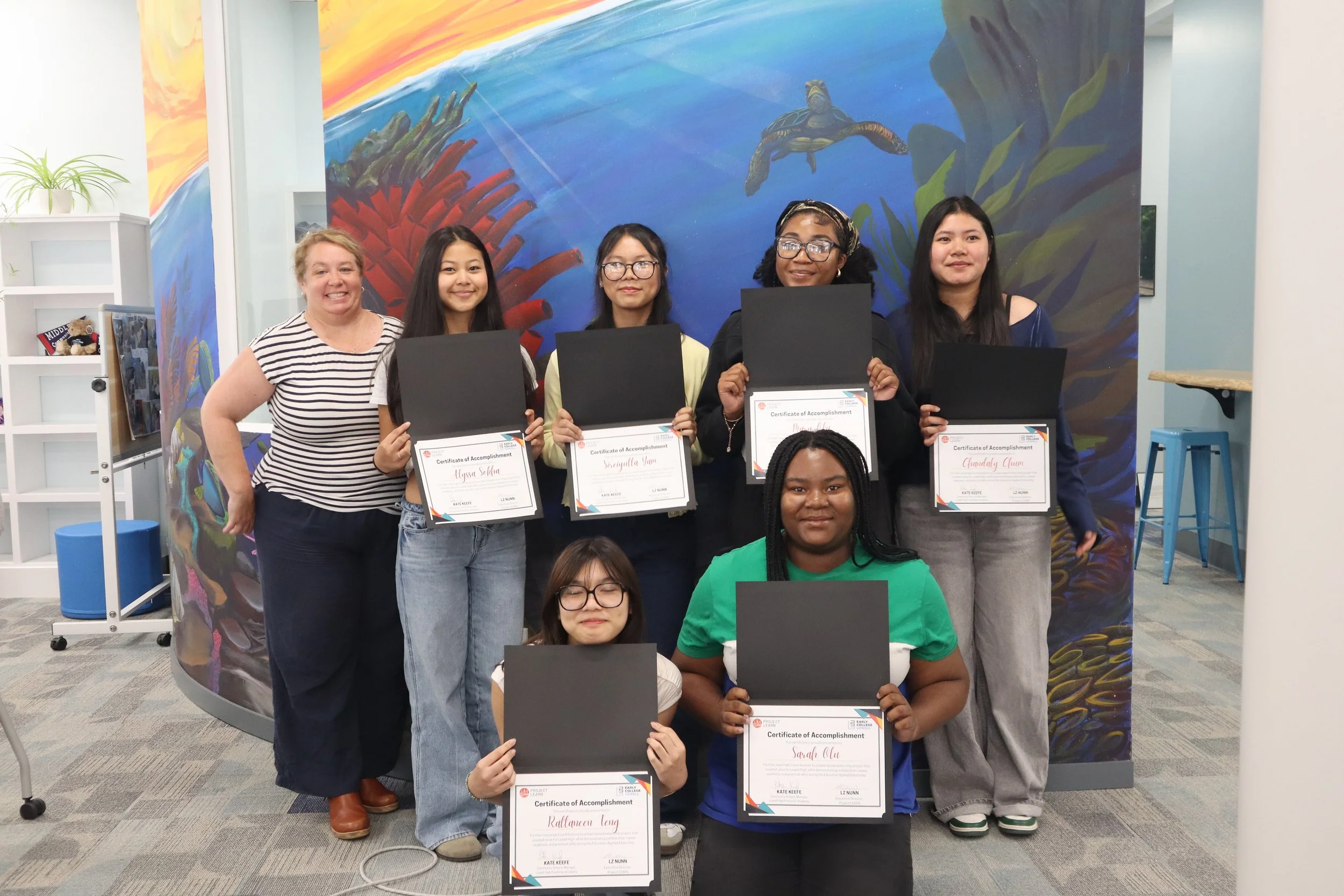Hands-On Summer Learning
By Jen Meyers
Originally Published in the LPS Notebook on August 7th, 2025
The best way to learn is to do.
In July, through a program run by Project LEARN, Inc., 25 Lowell High School students dove into externships, working with professional mentors to explore the worlds of cybersecurity, engineering, education, communications, and business/entrepreneurship.
The students researched real world problems and with guidance from their mentors came up with practical solutions, while learning about how to collaborate with others and how to manage their time efficiently.
On July 24, the five groups of students presented their projects at Project Learn’s new headquarters on Central Street.
Team Cybersecurity
The cybersecurity team, which included Kailyn Vazquez, Daniel Nguyen, Kaleb Tith, Ihor Semenov, and Nabiha Zahee, worked with Cisco System’s Cloud Security System Engineer Shaun Furey to create a course aimed at educating teens on the dangers lurking in cyberspace and how to avoid them.
The course, which the team said could be used not only for teens but for people of all ages, explores common cyber scams and attacks like phishing (when you receive a text, email, or message looking for personal information like the current toll scam text), fake social media profiles, and how to best protect your passwords and accounts.
Team Engineering
The engineering team, which included, S Naung Naung Lay, Irena Sambo, Wael Al Rekabi, Rachel Ngene, and Victor Nguyen worked with Forgione Engineering, Inc. President and Founder Matteo Forgione to learn about the history of and process of replacing the Rourke Bridge, which connects the city’s Pawtucketville and Highlands neighborhoods.
The two-lane Bailey pony truss bridge, named for former Mayor Raymond Rourke and his son State Rep. Timothy Rourke, was built as a temporary bridge in 1983 and was expected to be replaced in four or five years.
Forty-two years later, the span, which carries 27,000 vehicles daily over the Merrimack River is finally in the process of being replaced with a four-lane bridge that not only is more conducive to voluminous vehicle travel, but will also include better bicycle and pedestrian paths.
Lowell High student Irena Sambo said she learned something valuable about engineering by working on this project.
“Engineering is more than just math and science,” she said. “You also have to understand the legal aspects, environmental aspects, and how a project will impact people’s daily lives.”
Team Education
The education team, which included, Sireiyutta Yam, Chandaly Chum, Alyssa Sokha, Rattaneen Teng, Sarah Olu, and Mary Olu worked with Lowell High School Community Schools Program Manager Kate Keefe on ways to increase family engagement and involvement at LHS, especially around academic awareness.
The group analyzed current methods used by the school to communicate with families and opined that newsletters and social media posts tend to be too long and somewhat bland. Additionally, when important information is conveyed to students in class it never makes it home.
In order to make important information easier for families to absorb quickly, they redesigned one of the school’s weekly newsletters to make it more concise and easier to navigate, created a school event calendar, and explored ways to more effectively use social media to share events and information.
Team Communications
The communications team, which included Magdaline Fitzgerald, Osakuwe Imhontuniye, Miley Moeun, and Emmah Chhor, worked with Riverbend’s Director of Marketing, Communications & Corporate Relations Matthew Myers to explore ways to combat the stigma surrounding seeking treatment for substance abuse and other addiction disorders, like gambling, among members of Generation Z (ages 13-28).
The group explained that just in the past year, 260,000 members of Gen Z have experienced substance use disorders in Massachusetts. The age group is particularly vulnerable because of how heavily social media glamorizes vaping, drinking, gambling, and drug abuse while downplaying their dangers.
They created a public service announcement (PSA) video highlighting the importance of seeking treatment that includes a particularly strong message: “getting help doesn’t mean you’re broken; it means you are ready to rebuild.”
In addition to creating the video the group trained their peers at Project Learn in how to administer Narcan to someone experiencing an opioid overdose, wrote an op-ed to help people understand the root causes of addiction, and are creating a partnership between Riverbend and the LHS National Honors Society chapter to bring volunteers to Riverbend to increase awareness about the programs they offer.
LHS student Magdaline Fitzgerald said working on this project helped her and her peers learn not only about the issues they researched, but also about how to function in the workforce.
“We all feel we can work in a professional setting and work more efficiently,” she said.
Team Business/Entrepreneurship
The business/entrepreneurship team, which included Anastasia Orphanos, Alayshia Than-Ngeth Phlo, Nayara Agricourt, Brendan Soeung, and Steven Mtiziwa, worked with the team from Rise Social Relations and Project Learn’s Senior Development Manager Autumn Kleiner to explore ways to help Project Learn increase student awareness/involvement and attract donors.
The group researched examples of businesses that have thrived or failed in recent years, as well as interviewed several people who are involved with Project Learn. They then worked to create a social media campaign aimed at attracting both donors and drawing in students.

